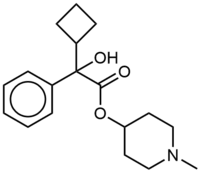EA-3580
EA-3580 is a potent anticholinergic deliriant drug with a fairly long duration of action, related to the chemical warfare agent 3-Quinuclidinyl benzilate (QNB). It was developed under contract to Edgewood Arsenal during the 1960s as part of the US military chemical weapons program, during research to improve upon the properties of earlier agents such as QNB.
 | |
| Identifiers | |
|---|---|
| |
| CAS Number | |
| PubChem CID | |
| ChemSpider | |
| CompTox Dashboard (EPA) | |
| Chemical and physical data | |
| Formula | C18H25NO3 |
| Molar mass | 303.402 g·mol−1 |
| 3D model (JSmol) | |
| |
| |
| (verify) | |
EA-3580 is closely related to the similar compound EA-3443, and has similar potency and high central to peripheral effects ratio, but with a duration of action around half as long, although effects of EA-3580 can still persist for 24 hours or more following high doses.[1][2]
See also
- EA-3167
- N-methyl-3-piperidyl benzilate
- N-ethyl-3-piperidyl benzilate
- 3-Quinuclidinyl benzilate
- Ditran
References
- "Possible Long-Term Health Effects of Short-Term Exposure to Chemical Agents". Commission on Life Sciences. The National Academies Press. 1982. pp. 207–211.
- Ketchum JS (2006). Chemical Warfare Secrets Almost Forgotton. A Personal Story of Medical Testing of Army Volunteers with Incapacitating Chemical Agents During the Cold War. ChemBooks Inc. ISBN 978-1-4243-0080-8.
| Psychedelics (5-HT2A agonists) |
| ||||||||||||||||||||||||||||||||||||||||||||||||||||||||||||||||||
|---|---|---|---|---|---|---|---|---|---|---|---|---|---|---|---|---|---|---|---|---|---|---|---|---|---|---|---|---|---|---|---|---|---|---|---|---|---|---|---|---|---|---|---|---|---|---|---|---|---|---|---|---|---|---|---|---|---|---|---|---|---|---|---|---|---|---|---|
| Dissociatives (NMDAR antagonists) |
| ||||||||||||||||||||||||||||||||||||||||||||||||||||||||||||||||||
| Deliriants (mAChR antagonists) |
| ||||||||||||||||||||||||||||||||||||||||||||||||||||||||||||||||||
| Others |
| ||||||||||||||||||||||||||||||||||||||||||||||||||||||||||||||||||
| mAChRs |
| ||||
|---|---|---|---|---|---|
| Precursors (and prodrugs) | |||||
See also: Receptor/signaling modulators • Nicotinic acetylcholine receptor modulators • Acetylcholine metabolism/transport modulators | |||||
This article is issued from Wikipedia. The text is licensed under Creative Commons - Attribution - Sharealike. Additional terms may apply for the media files.